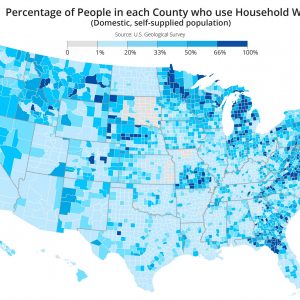Federal Water Tap, October 1: Sixth Circuit Rulings Muddle Question of Clean Water Act Authority over Groundwater
The Rundown
Two appeals court decisions contradict what other circuits concluded about groundwater and the Clean Water Act. Federal agency officials tell a Senate committee that PFAS drinking water regulations will take years to finalize, if the agency decides to regulate them. Bill introduced in Congress would provide health benefits to veterans sickened by PFAS chemicals. The EPA withdraws a rule restricting new uses of 145 chemicals and plans to reissue it. After an anchor strike earlier this year dented an oil pipeline, the Coast Guard prohibits ships from anchoring in Michigan’s Straits of Mackinac. NOAA finds that a 100-year rain storm in Houston and other parts of Texas is now significantly more severe. And lastly, Congress did not pass a farm bill before the old one expired.
“When I was in India, in Hyderabad, after all of that had been applied and brought together, I had the honor of inaugurating 50 water ATMs in Hyderabad, created largely by private investment. And what they do is make available — primarily to women — 24 hours a day, affordable, safe, clean drinking water. That, to me, is proof of model. That, to me, is the inspiration for where we hope we can all go in that journey to self-reliance. In the Trump Administration, we believe in the innate desire of every community, every country to want to craft its own bright future. But because self-reliance and those notions are cooked into our DNA as Americans, when countries are willing to set out on that journey, we believe we have an obligation to walk with them along the way. That’s what we call the Journey to Self-Reliance.” — Mark Green, administrator of the U.S. Agency for International Development, speaking at the Concordia Summit, an event taking place in New York alongside the opening of the United Nations General Assembly. Green’s vision for foreign assistance is to lift up countries so that aid is not necessary.
By the Numbers
$34 million: Funding for seven water, food, and climate research projects. Projects include: cover crops and soil water in the Southeast and snowpack and water allocation in the West. (National Institute of Food and Agriculture)
145: Chemicals for which the U.S. Environmental Protection Agency rescinded a rule from August that restricted new uses. The rule included prohibitions on releasing several of the chemicals into rivers and lakes. The agency rescinded the rule because it received “adverse comments,” which, by law, triggers cancellation. Chemical companies claimed that some of the chemicals were already in use and that the agency did not follow proper procedures in writing the rule. The agency will address those concerns and reissue the rule. (EPA)
News Briefs
Appeals Court Rulings
Throwing more confusion into the scope of the Clean Water Act, the Sixth Circuit Court of Appeals, in two separate cases, ruled that pollutants that enter rivers and lakes via connected groundwater are not covered by the act.
Environmental groups in both cases claimed that pollutants that move from coal ash ponds through groundwater and enter rivers should be regulated, an argument known as the conduit theory. The U.S. Environmental Protection Agency took the same position during the Obama administration.
But the three-judge panel, which heard both cases, disagreed.
“We find no support for this theory in either the text or the history of the [Clean Water Act] and related environmental laws,” Judge Richard Suhrheinrich wrote in his majority opinion in Tennessee Clean Water Network v. Tennessee Valley Authority.
“For a point source to discharge into navigable waters, it must dump directly into those navigable waters—the phrase ‘into’ leaves no room for intermediary mediums to carry the pollutants,” Suhrheinrich wrote in Kentucky Waterways Alliance v. Kentucky Utilities Company, basing his argument on the language of the act.
The rulings — also in Sierra Club v. Virginia Electric & Power Company, a case decided in the Fourth Circuit earlier in September — diverge from other appeals court decisions in the last year on the same issue. Those earlier cases, which found that the discharges with a direct hydrological connection via groundwater should be regulated as a point source, stemmed from municipal wastewater injection wells in Maui and a pipeline leak in South Carolina.
The U.S. Supreme Court may have the ultimate word. The losing side in two appeals court cases that upheld the conduit theory have petitioned the high court for a hearing. Those cases are Upstate Forever v. Kinder Morgan Energy Partners and County of Maui v. Hawaii Wildlife Fund.
Senate Committe PFAS Hearing
A management plan expected to be released by the end of the year will guide the EPA’s decisions whether to regulate PFAS chemicals, an agency official told senators during a committee hearing last week. Finalizing drinking water rules would take years, said Peter Grevatt, head of the EPA Office of Ground Water and Drinking Water.
Read a recap of the hearing at Circle of Blue.
Coast Guard Regulates Anchoring in Straits of Mackinac
To avoid damaging twin oil pipelines on the lake bed, the U.S. Coast Guard finalized a rule that prohibits ships from dropping anchors in the Straits of Mackinac, which connect lakes Huron and Michigan.
The Line 5 pipeline, operated by Enbridge, a Canadian company, was dented by an anchor in April this year but did not leak. Researchers say that the straits, because of the turbulent currents, would be the worst spot in the Great Lakes for an oil spill. Activists are trying to get the Michigan government to shut down the pipelines.
The Coast Guard rule prohibits ships from anchoring or “loitering” in the straits. Loitering does not include sightseeing boats that stop briefly. (Touring companies asked for this exception during public comments.) The rule allows ships to drop anchor in an emergency, such as a sudden storm that makes passage treacherous.
Medical Care for Veterans Exposed to PFAS Chemicals
Bills introduced in the House and Senate would provide health benefits for veterans sickened by PFAS chemicals while on military bases.
The Veterans Exposed to Toxic PFAS Act is linked to a health study of veterans who were exposed to the chemicals. Veterans Affairs hospitals will have to cover diseases that the study connects to PFAS.
Studies and Reports
NOAA Redefines Texas Rainfall Frequencies
A 100-year flood — or, the amount of rain that has a one-in-100 chance of occurring in a year, based on the historical record — isn’t what it used to be in Texas. Neither is a 100-year rain storm. It’s a lot more severe.
Houston’s 100-year rain storm, measured over a 24-hour period, increased from 13 inches to 18 inches, according to new calculations by the National Oceanic and Atmospheric Administration. The old standards were developed in forty years ago or more.
Rainfall and flood frequency estimates influence building codes, engineering specifications, and land use policy.
Groundwater Availability in the Williston Basin
The Williston basin, site of rapid oil production growth in the last decade, covers parts of Montana, North Dakota, South Dakota and the Canadian provinces of Manitoba and Saskatchewan.
Because of increasing water demand for oil drilling, the U.S. Geological Survey evaluated the basin’s groundwater resources and developed a computer model of groundwater flows, to aid local and states water managers.
Though oil development resulted in an increase in groundwater withdrawals, the period of increase fortunately coincided with one of the wettest periods on record. Regionally, oil development had minimal effect on groundwater, but there were significant local effects.
On the Radar
Hurricane Harvey Investigation
Speaking of big rain, the EPA Office of the Inspector General is beginning an investigation of the agency’s management of funds for Hurricane Harvey emergency response.
Farm Bill Expires
Senators and representatives said they would get it done. They didn’t.
The current farm bill expired on September 30, and Congress failed to pass a replacement for the gargantuan legislation that delivers crop insurance to corn farmers and conservative funding as well as provides food aid to the poor through the SNAP program.
“Where we sit right now it is across almost all of the titles, there are legitimate policy differences of opinion across them,” Rep. Mike Conaway, the chair of the House Agriculture Committee, said. “It’s not just SNAP, it’s not just the farm bill, it’s not just conservation, it’s not title — it’s a variety of things that we have yet to come to grips with.”
As for practical effects, SNAP will continue payments and existing contracts will be honored, but conservation programs will not be able to enroll new farmers.
Federal Water Tap is a weekly digest spotting trends in U.S. government water policy. To get more water news, follow Circle of Blue on Twitter and sign up for our newsletter.
Brett writes about agriculture, energy, infrastructure, and the politics and economics of water in the United States. He also writes the Federal Water Tap, Circle of Blue’s weekly digest of U.S. government water news. He is the winner of two Society of Environmental Journalists reporting awards, one of the top honors in American environmental journalism: first place for explanatory reporting for a series on septic system pollution in the United States(2016) and third place for beat reporting in a small market (2014). He received the Sierra Club’s Distinguished Service Award in 2018. Brett lives in Seattle, where he hikes the mountains and bakes pies. Contact Brett Walton






Leave a Reply
Want to join the discussion?Feel free to contribute!